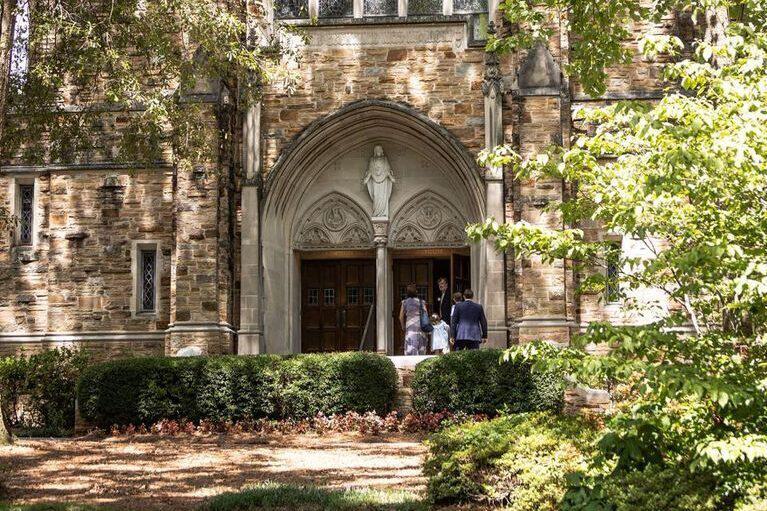MONTGOMERY — First United Methodist Church (FUMC) - Montgomery is continuing to explore options to disassociate from the United Methodist Church (UMC) denomination after a recent rule change in the church's hierarchy changed the process by which churches can leave the denomination.
At a Wednesday meeting, over 100 members of FUMC met to discuss the process of leaving the UMC and gave a timeline order of the events that led them to the current situation.
Last month, members of the FUMC administrative board voted to begin the discernment process to consider whether or not to leave the UMC.
Despite the committee following the correct process of disaffiliating from the UMC, the Alabama-West Florida Conference of the United Methodist Church (AWFUMC) board of trustees changed the rules by which a UMC church can disaffiliate last Tuesday. They also approved a rule clarification to prevent over 200 disaffiliating clergies from receiving retirement benefits.
The previous rules required a formal discernment period. After which, the congregation could vote to disaffiliate from the denomination officially. The changed rules are such that most felt disaffiliation would be "virtually impossible" for churches to leave within the prescribed timeframe.
The updated policy now requires that the Church Council of churches in the AWFUMC, which seek to enter the disaffiliation process, "adopt a statement of eligibility that demonstrates the current and specific disagreement(s) that the local church has with the changes in the Book of Discipline made in 2019."
Under the new AWFUMC policy, the "statement of eligibility" must be signed by all elders, deacons and local pastors.
Moreover, the trustees claim the authority to use the statement to determine whether or not the church is eligible for disaffiliation.
Churches have until December of this year to disaffiliate. If they do not break away by then but decide to disaffiliate in the future, they could be forced to surrender church property.
The head pastor of FUMC was missing from the meeting, as congregants said he was more sympathetic to staying in the UMC, despite the congregation's desires.
"In the fall of 2022, our senior pastor publicly announced that he would stay in the UMC regardless of what our church elected to ultimately do," one speaker said. "So he made it very clear that he had essentially chosen the denomination over the congregation."
The issues plaguing the UMC, which has led to hundreds of churches in Alabama alone disaffiliating, came with the ordination of openly gay bishops and clergy, a direct contradiction to the "Book of Discipline."
The Book of Discipline, which is defined as "the instrument for setting forth the laws, plan, polity, and process by which United Methodists govern themselves," expressly says, "[S]elf-avowed practicing homosexuals are not to be certified as candidates, ordained as ministers, or appointed to serve in The United Methodist Church." However, many in the UMC anticipate the removal of that stipulation in next year's general conference meeting.
Despite beginning the disaffiliation process under the old rules, the district superintendent informed the members that they would have to proceed under the new rules adopted by the board of trustees.
Although hope for proper disaffiliation is scant among traditionalist Methodists, Wednesday's speakers concluded with messages of hope for the church's future.
Lester Spencer, the lead pastor at St. James Church, which also disaffiliated from the UMC, spoke to the Wednesday crowd on what to expect next.
"I just want to encourage you tonight," Spencer said. "I know we've said some tough things, but I want to encourage you. You're here. This is a big group. This is a lot of people, and you love your church. I would just say, keep standing up, keep speaking the truth and keep trying to move forward. And, there is hope. Whatever happens, the Lord is in control. It's His church."
The waves of disaffiliations are part of an ongoing process for individual congregations to choose whether to remain a part of the UMC, become independent or join other Methodist denominations.
The UMC began ordaining women in the mid-20th century, has supported federal gun control and was once a part of the pro-abortion Religious Coalition for Reproductive Choice (RCRC) before withdrawing in 2016.
Despite the prohibition of homosexual clergy, the issue of homosexuality is widely debated within the denomination.
These issues, underpinned by theological disagreements, eventually led traditional Methodists in the UMC to push for a process of separation that allowed churches to separate while retaining their church property.
Last month, nearly 150 congregations in north Alabama chose to disaffiliate with the UMC, just four days after almost 200 churches in the state's southern half left the denomination. Combined with the 198 churches in the state that left the denomination in December 2022, around 500 total churches have left the UMC.
To connect with the author of this story or to comment, email craig.monger@1819news.com.
Don't miss out! Subscribe to our newsletter and get our top stories every weekday morning.










